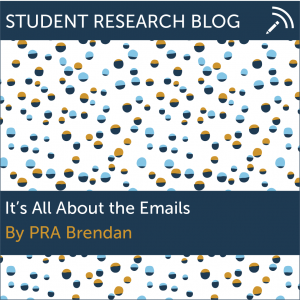By Brendan Hogan, OUR Peer Research Ambassador
Reaching out to faculty you’re interested in working with can be intimidating. But it doesn’t have to be. The tips below helped me get started and take the first steps in building connections and finding a research opportunity.
As a freshman, I was given the opportunity to work for Professor Morrell on the Scholio Project through a research assistant program in my major. I learned many skills working with Professor Morrell, including how to multitask, be forward thinking, and staying patient (you can check out more of this at my last blog post here). What I did not learn through this program was how to reach out to professors to talk about working alongside them on their research.
After the Scholio Project, I knew I wanted to continue to be involved in research. With many topics that intrigued me, I started by thinking about the professors I had taken classes with. However, I realized that many of them were not currently working on projects that interested me. I felt stuck, and had actually lost hope of joining a research team. Then my supervisor in OUR, Melissa Berkey, recommended that I begin looking at all the faculty on the Political Science department website, and expand my search into other related departments. She pointed out that most department websites have lists of affiliated faculty with their bios. On the websites, she said I would potentially be able to find the projects that professors are currently working on and their research interests. Following her advice, I compiled a list of professors whose work or projects aligned with my interests.
The next step scared me. I knew I should email each of them on the list, but, I was anxious and concerned that they would ignore me or that I would not have enough experiences to offer them. On top of that, I did not know what to say, as I had never met many of the professors. However, with Ms. Berkey’s guidance, I was able to compose the emails. Ms. Berkey emphasized three things that helped me through this process.
First, the emails must be sincere and genuine. It is important that when you email a professor, you are reaching out to them with an honest interest in their work. Many professors have limited time and will typically respond to only those that honestly portray a true interest. To do this, introduce yourself with your name, major, and why the work connects with your personal interests and career goals.
Second, be reasonable in your initial request. Researchers want what is best for their projects, and if a student they don’t know asks to join their team, they may be hesitant to say yes. Thus, move to establish a relationship with the professor by asking to meet and talk about their project. From my own experience, I’ve found that many professors love talking about their work. On top of that, they opened up and recommended other projects and professors once they found we shared common interests. By taking this opportunity, you can learn more about their project, see if you like interacting with the professor, and potentially request a position on their team.
Third, emails should be concise. As many professors do not have much time to read through long emails, it is important to keep this initial contact email between 3-5 sentences so that it is quick to read and right to the point. I sent out around 5 emails each week, for 3weeks, until I finally found a project to work on with Professor Anievas. Once I emailed back and forth with Professor Anievas for a week, we talked over the phone as it was the summer semester.
Looking back on this process, I found that Ms. Berkey was right. The best way to approach this was to stay true to yourself, request more information on the project, and keep it relatively short and straightforward (you can find more here on the “Email Etiquette” page).
Sending out that first email can be tricky, but it is important to realize it doesn’t require much on your part. As long as you follow the above advice, this step in getting started in undergraduate research can be simple and painless. Plus, once the first email is sent, you will find it is an even easier to send out the rest. Sometimes, to find the best opportunities, you need to put yourself out there. In doing that in this situation, you will likely find a research project that best fits your interests.
If you have any questions, feel free to reach out to me! Good luck emailing!
Brendan Hogan is a junior majoring in Political Science, Psychology, and Philosophy. Click here to learn more about Brendan.